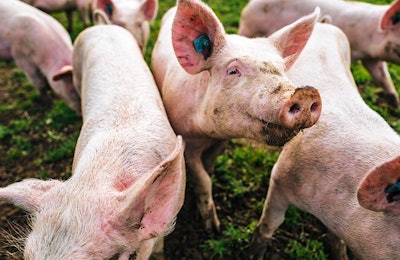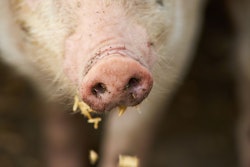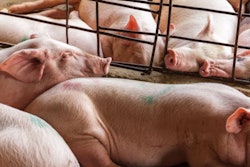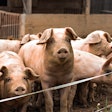
Disease continues to spread through the wild boar population as well.
In Europe, new outbreaks of African swine fever (ASF) have been confirmed in domestic pigs in Bulgaria, Romania, Russia and Ukraine. The disease continues to decimate the wild boar population in central and eastern Europe.
Reporting the most significant developments in terms of new outbreaks in domestic pigs over the past week is Ukraine. Here, the disease appears to have returned to the oblasts of Kirovohrad and Kherson, where the ASF virus was last detected in 2019.
In the last week of March, the presence of the virus was confirmed at a farm in the southern oblast of Kherson. According to the official report from Ukraine’s veterinary authority to the World Organisation for Animal Health (OIE), 27 of the 285 pigs at the farm died, and the rest have been destroyed.
Around the same time, there was an ASF outbreak in Kirovohrad, which is in central Ukraine. Affected was what is described as a backyard herd with 289 pigs. Seven of the animals died. The others have been culled, and their carcasses destroyed.
One week ago, a second ASF outbreak was confirmed in Vinnitsa, another central oblast of Ukraine.
ASF detected at two more Bulgarian farms
At the end of March, pigs at two small farms tested positive for the ASF virus. The nation’s veterinary agency reported to the OIE that three of the animals had died, and a further 306 were destroyed to control the spread of the disease. Affected premises were in the eastern provinces of Shumen and Varna, where previous ASF cases have been recorded.
More of Romania’s backyard pigs infected with ASF
There have been a further nine outbreaks of ASF in small backyard herds in Romania, according to the latest official reports to the OIE. Involving the direct loss of 155 pigs through mortality and culling, these outbreaks occurred across the country.
ASF hits Russian backyard herd
All four of the pigs in a backyard herd have recently died as the result of ASF in the Republic of Adygea, according to the Russian agriculture ministry. In its report to the OIE, the ministry records the outbreak in the district of Maykopsky at the end of March.
Republic of Adygea is located in Russia’s Southern Federal District.
Gradual rise in ASF cases among European pigs
Up to March 30, there have been 216 confirmed outbreaks of ASF among domestic pigs in Europe since the start of 2020, according to the European Commission (EC). This total has risen by five since the previous week.
From this source, worst affected has been Romania — with 194 outbreaks, which is four more than the previous week’s total. Bringing its national count to 16, there has been one new outbreak in Bulgaria. There have been no new outbreaks in the other countries that have reported ASF this year. Their totals remain at three for Ukraine, and one each for Greece and Moldova.
Over the whole of 2019, there were 1,885 ASF among domestic pigs in Europe, according to the EC. EC figures do not include Russia.
ASF outbreaks in wild boar jump by over 500
Up to March 30, the EC had recorded 3,842 confirmed ASF outbreaks among Europe’s wild boar population so far this year. This represents an increase of 515 from the previous week’s total.
At 1,715 and 1,232, respectively, Poland and Hungary have reported the highest number of cases over this period. Other countries reporting significant numbers of ASF-infected wild boar are Romania (381), Bulgaria (207), Latvia (82), Lithuania (68) and Slovakia (46). Also with confirmed cases in wild boar this year are Italy, Serbia, Estonia, Moldova, Ukraine and Belgium. Each of these countries has reported the virus in fewer than 40 animals.
Over the past week, Hungary’s animal health agency has reported the highest number of ASF cases among wild boar to the OIE. Of the total of 231 new cases confirmed in Hungarian wild boar, 130 were found in the northeastern region of Borsod-Abauj-Zemplen, which borders Slovakia.
Other European countries reporting new cases in wild boar to the OIE over the past week were Romania (102 animals), Latvia (6), and Moldova, Russia and Slovakia (each with two new cases).
While stressing that the ASF situation is not yet resolved, Slovakia’s agriculture ministry has reported to the OIE that the disease has stabilized. Since December 2019, ASF has been confined to the wild boar population, and apparently eliminated from the country’s domestic pigs. From now on, the ministry will report to the OIE only every six months.
View our continuing coverage of the global African swine fever situation.


















